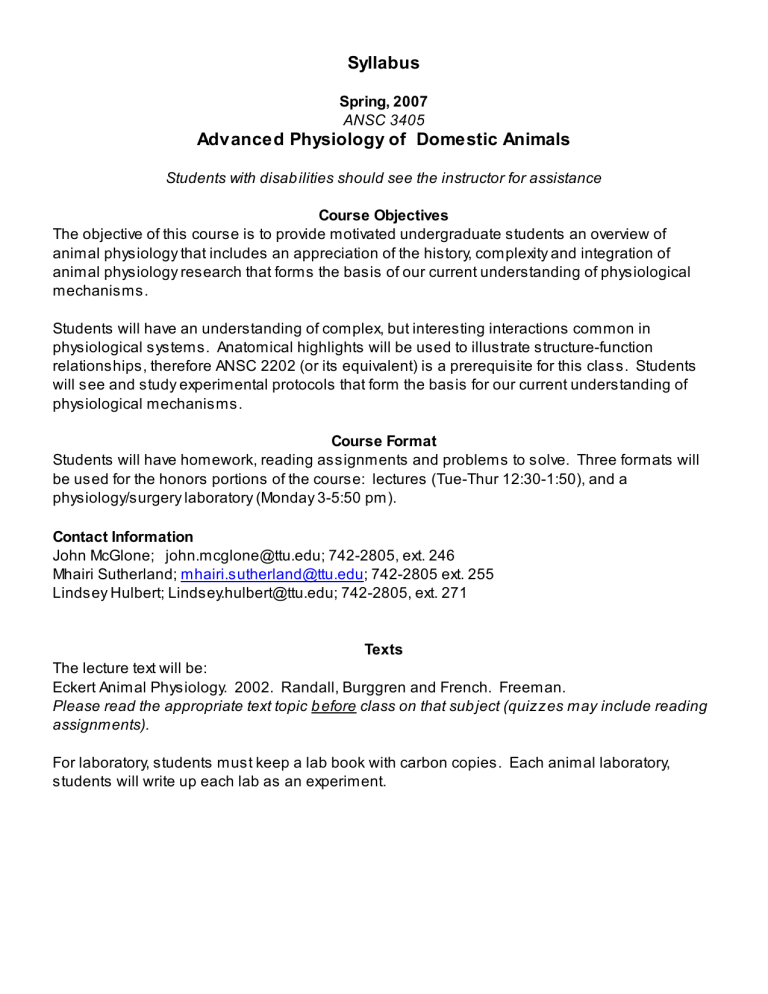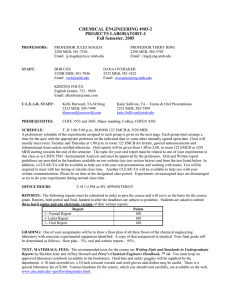Syllabus Advanced Physiology of Domestic Animals

Syllabus
Spring, 2007
ANSC 3405
Advanced Physiology of Domestic Animals
Students with disabilities should see the instructor for assistance
Course Objectives
The objective of this course is to provide motivated undergraduate students an overview of animal physiology that includes an appreciation of the history, complexity and integration of animal physiology research that forms the basis of our current understanding of physiological mechanisms.
Students will have an understanding of complex, but interesting interactions common in physiological systems. Anatomical highlights will be used to illustrate structure-function relationships, therefore ANSC 2202 (or its equivalent) is a prerequisite for this class. Students will see and study experimental protocols that form the basis for our current understanding of physiological mechanisms.
Course Format
Students will have homework, reading assignments and problems to solve. Three formats will be used for the honors portions of the course: lectures (Tue-Thur 12:30-1:50), and a physiology/surgery laboratory (Monday 3-5:50 pm).
Contact Information
John McGlone; john.mcglone@ttu.edu; 742-2805, ext. 246
Mhairi Sutherland; mhairi.sutherland@ttu.edu
; 742-2805 ext. 255
Lindsey Hulbert; Lindsey.hulbert@ttu.edu; 742-2805, ext. 271
Texts
The lecture text will be:
Eckert Animal Physiology. 2002. Randall, Burggren and French. Freeman.
Please read the appropriate text topic before class on that subject (quizzes may include reading assignments).
For laboratory, students must keep a lab book with carbon copies. Each animal laboratory, students will write up each lab as an experiment.
Grades will follow the standard break points:
Total Points Needed
Grading
90.0% A 720
80.0-89.9% B 640
70.0-79.9% C 560
60.0-69.9% D 480
Below 60.0% F <480
Animal science majors must have a C or better to receive credit for this course.
Source of points
Hour exams (3) 300 (37.5%)
Quizzes, homework, projects 100 (12.5%)
Final exam (comprehensive) 200 (25%)
Laboratory 200 (25%)
-----------------
Total 800 (100%)
Quizzes, Exams and Homework Assignments
The lecture will have three hour exams and a final exam. Each exam will be comprehensive.
That means that each exam can include all of the material previously presented. Some topics re-appear later in importance and many topics build on each other, so it is important not to forget the past material because we have an exam. The final is also a comprehensive exam.
A total of 10 quizzes, homework assignments or other assignments will be completed. The assignments must be turned in on time. The penalty for turning in any assignment late is 25% of the points per day they are late. If you must travel on university or personal business, assignments must be turned in ahead of the trip. Most homework assignments will be checked in the lab workbook. If there are missing assignments in the workbook, the student must make sure to complete the assignment for the next workbook check or more points will be deducted.
Attendance in Class and Lab
Attendance in class and labs is mandatory. You may miss two unexcused class lectures without penalty. Beyond that, there will be a 20 point penalty per missed class (after the first 2). If you know you will absent prior to class, please let us know.
Attendance in laboratory is mandatory. It is very difficult to make up laboratories due to the
“hands-on” nature of the class. There must be an excused absence (doctor’s note, funeral, etc…) for any lab that is missed. For each unexcused absence in lab, 10 pts will be deducted from the lab grade.
Laboratory
Every student participates in every laboratory. Notebook records will be complete. Students will be assigned one of 5 experiments to present at the end of the lab class. The lab notebook will be 20 points per study. The presentation of your study will be worth 100 points.
Students will need to have a chemistry lab notebook that has carbon copies that can be turned in each week.
Lecture Topics and Approximate Dates*
Day
Th
T
Th
T
Th
T
Th
T
Th
T
Th
Date
11-Jan
16-Jan
18-Jan
23-Jan
25-Jan
30-Jan
1-Feb
6-Feb
8-Feb
13-Feb
15-Feb
Topics
Introduction/ Homeostasis/ body size
Cell Biology
Cell Biology
Readings/Assignments
Preface, Ch 1; p
675-681**
Ch 2,3
Quiz 1, Ch 4
Neuroendocrinology Ch 5,6,9
Endocrinology/Reproduction Ch 9 + materials provided
Neurons
Nervous system I
Exam #1
Nervous system II
Nervous system III
Nervous system conclusions
Ch 5
Quiz 2, Ch 8
All prior material
Ch 8
Ch 8
Quiz 3, Ch 7
Instructor
JJM
JJM
LH
LH; MG
LH; MG
JJM
JJM
MG
JJM
JJM
JJM
Th
T
Th
T
Th
T
T
Th
T
Th
T
Th
T
Th
20-Feb
22-Feb
27-Feb
1-Mar
6-Mar
8-Mar
13-Mar
15-Mar
20-Mar
22-Mar
27-Mar
29-Mar
3-Apr
5-Apr
Sensory
Sensory
Muscles/Movement
Movement/Cardiovascular
Cardiovascular
Exam # 2
No class
No class
Cardiovascular
Exam #2
Respiratory/Acidbase/Osmotic/Ionic
Osmotic/renal
Digestion
Digestion & Metabolism
Ch 7
Quiz 4
Ch 10,11
Quiz 5, Ch 12
Ch 12
All Prior material
SPRING BREAK
SPRING BREAK
Ch 13
Quiz 6, Ch 13
Ch 14
Quiz 7, Ch 14
Ch 15
Ch 15
MS; MG
MS
MS
JJM
JJM
JJM
JJM
JJM
JJM
GI DOCS
GI DOCS
T
Th
T
Th
10-Apr
12-Apr
17-Apr
Hematology/immunology
Immunology
Immunology
Integrated Physiology
Materials provided
Quiz 8
Materials provided
Materials provided Quiz
9
LH
MS
MS
JJM
19-Apr
T
Th
T
24-Apr
26-Apr
1-May
Hour Exam #3
Integrated Physiology
Review
FINAL EXAM
(last day to give exams)
Quiz 10/replacement
Quiz
JJM
ALL
** Start with Heading: BODY SIZE AND METABOLIC RATE on page 675 and go through the
Question box on page 681 (Energetics will be covered later).
*The instructors reserve the right to change the schedule and exams with prior notice to
students.
Laboratory (Mon 3:00-5:50)
4
5
2
3
#
1
Date
22-Jan
29-Jan
5-Feb
12-Feb MG
19-Feb
26-Feb
5-Mar
Topic
Cell Biology/Hematology; Pipetting; ACUC;
Literature searches
General large animal surgical practices
Rodent and surgical techniques
Rodent care, Behavior tests and endocrinology
Immunology 1
Immunology 2
8
6
7
9
10
11
12
12-Mar MG
19-Mar
26-Mar
2-Apr
9-Apr
16-Apr
23-Apr
No class; spring break
Pig brain surgery (i.c.v. cannula + i.v.
catheter)
Neuroendocrinology/behavior
Cardiovascular, Renal and brain anatomy
No Class; Easter holiday
G.I. physiology
Integrated physiology
13 30-Apr Laboratory final presentations
Laboratory Experiments
1 Reproduction/endocrinology
2 Neuroscience
3 Cardiovascular/Renal
4 Immunology
5 Gastrointestinal plus
6 Integrated physiology
Experiment
1
1, 2
3
5
1
2
4
4


